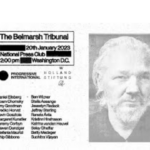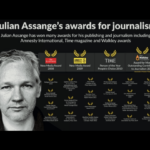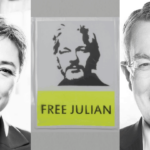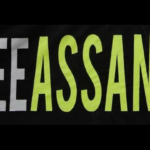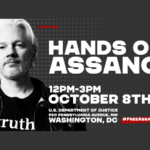Belmarsh Tribunal Calls on Albanese to Truly Take Action on Assange’s “Death by Process”
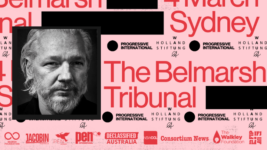
On opening the fifth instalment of the Belmarsh Tribunal, co-chair Australian journalist Mary Kostakidis outlined that the subject of proceedings, Julian Assange, has suffered thirteen years of arbitrary detainment, which has most recently included four in a maximum security prison.
Kostakidis further set out that the persecution of the WikiLeaks founder “is an attempt to neutralise the ability of investigative journalism to hold the powerful to account by subjecting one courageous journalist to death by process.”
Named after London’s Belmarsh Prison, where Assange has been remanded since 2019, the tribunal has been modelled on the 1960s War Crimes Tribunal held by philosophers Bertrand Russell and Jean-Paul Sartre, which served to evaluate US foreign policy and that nation’s operations in Vietnam.
Tribunal co-chair lawyer and journalist Mark Davis told the audience that if there is one thing he wanted to instil in them, it’s that despite ongoing assertions claiming that Assange did not redact the names of individuals identified in classified documents that he published, he certainly did do this.
Davis spent a month with Assange in the leadup to the release of the Iraqi War Logs in 2010, and he added that this slur is a complete falsehood, as he watched Julian redacting 10,000 names from the files “of people who had potential harm, and he did it around the clock for three days”.
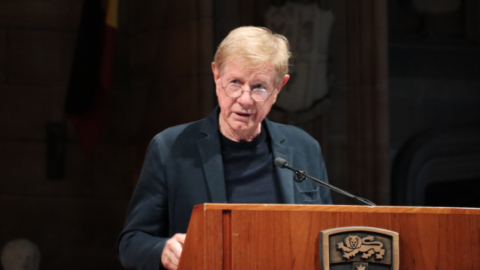
A legacy of Trump
Sixteen eminent individuals spoke at the 4 March event, including ex-CIA officer John Kiriakou, politician Yanis Varoufakis, Stella Assange, Assange’s legal counsel Jennifer Robinson, former Reuters Baghdad bureau chief Dean Yates and human rights lawyer Kellie Tranter.
First to address the tribunal was veteran Australian journalist Kerry O’Brien, who preceded to set out the fundamentals of the Assange case, starting with the fact that over 2010 WikiLeaks published a massive number of classified US documents leaked by former US army officer Chelsea Manning.
“Many of the revelations were deeply embarrassing to the United States and its allies, including Australia,” recalled O’Brien, adding that Manning was sentenced to 35 years for leaking the documents, but was then released early by former US president Barack Obama, after serving seven.
“Tellingly, there was no effort by the Obama administration to go after Julian Assange, the publisher of the devastating document dump, even though they had become obsessed about leaks and punishing leakers,” the journalist continued.
O’Brien went on to explain that it was the coming of Trump and his CIA head Mike Pompeo that now sees Assange sitting in Belmarsh gaol whilst the US attempts to extradite him.
Key developments since the Albanese government took office, he continued, are that negotiations on Assange are supposedly taking place with the US, but these are done in secret, along with the attorney general’s press freedoms roundtable that was also held behind closed doors last week.
Calls for greater press freedoms from AG Mark Dreyfus “should apply equally” to Assange, O’Brien made clear. And the longer he’s caught “in the web of US legal procedure… without demonstrable and effective intervention… the more the Australian government’s credibility will suffer.”
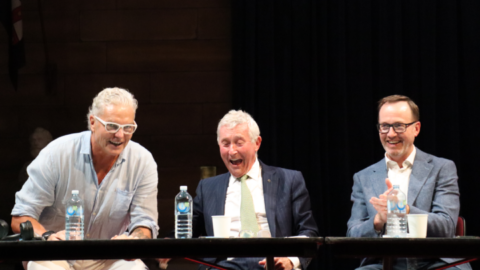
Creeping authoritarianism
As the event put on by Progressive International continued within the Great Hall at Sydney University, Townsville-born Assange was incarcerated in Belmarsh Prison, pending two appeals of his already UK government-approved US extradition that would see him facing up to 175 years inside.
“It should never be a crime to tell the truth”, said Greens Senator David Shoebridge, who went on to outline some of the political context that has led our government in failing to “stand up for the rights of our citizens and for that principle of it never being a crime to tell the truth”.
“To do that we should look at the pattern in which the executive government and the courts have been used… to target an institutionalised attack on the truth… journalists and whistleblowers, with the clear aim of not just silencing Julian but anyone who dares follow his example.”
Shoebridge pointed to the ongoing attacks on local whistleblowers, which saw then Morrison government AG Christian Porter greenlight the prosecutions of lawyers Bernard Collaery and David McBride, as well as that of ATO officer Richard Boyle, in the name of national security.
This “so-called national security interest, the compliance with our large and powerful so-called ally, some would say decisionmaker, the United States…”, Shoebridge underscored, “is trumping the demand for justice with Julian”.
Bearing witness
Attorney general Dreyfus dropped the prosecution against whistleblower Timor-Leste Bernard Collaery on taking office.
For his part, the respected ACT barrister told last Saturday’s tribunal that it’s clear to him that “Julian is not a prisoner facing genuine due process”, but rather the Australian journalist “fits precisely” what is “the international definition of a hostage”.
Collaery suggested that moves should be commenced to raise a motion in the UN General Assembly to pass a resolution on this matter, as the US signed the convention against hostage-taking, “with very unusual alacrity” two days after it was tabled before the assembly in 1979.
The barrister then asserted that the US – in having reached out and arrested Assange by proxy on charges that involve extraterritorial claims regarding actions committed in a foreign jurisdiction and then having the UK remand him on its behalf – is imprisoning the Australian journalist unlawfully.
While, in addressing the tribunal, ADF whistleblower David McBride stood as a truth teller the Albanese government is continuing to pursue for having exposed Australian war crimes in Afghanistan, which Canberra then went on to investigate and reveal itself via the Brereton report.
“Julian Assange is a prisoner of war in a civil war,” said McBride, who’s facing charges that could see him spend the rest of his life in prison. “His country is not so much Australia. His country is truth. His country is law. And he is held by people whose country is lies and greed.”
“Assange believed in the rule of law. He believed in democracy,” the lawyer declared, as he ensured the crowd that the cause of truth will win.
“Don’t believe he’s a criminal. He is not a criminal any more than I am a criminal. I revealed the truth and people can’t stand being embarrassed.”


